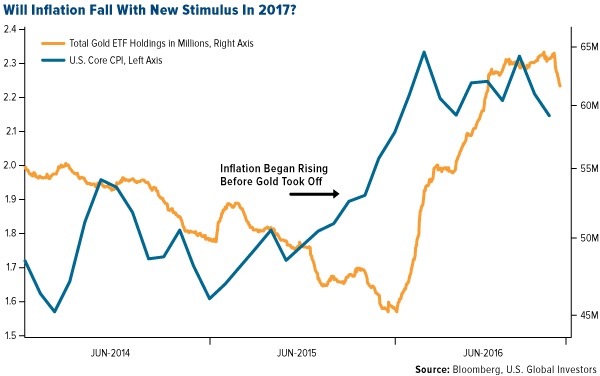Will Inflation Fall With New Stimulus In 2017?
Strengths
- The best performing precious metal for the week was palladium, up 2.83 percent. China boasted imports of silver, platinum and palladium in October. In addition, vehicle sales in Europe are up 4.7 percent through October in 2016 versus a year ago. Global auto sales are tracking at over 3 percent, recovering from sub-2 percent growth in 2015.
- With worries over a supply shortage due to Beijing’s efforts to restrict import licenses, gold premiums in China jumped to their highest in nearly three years this week, reports the Business Standard. One analyst with GFMS, Zhirui Ji, says potential restrictions on gold imports may have to do with limiting the outflows of the Chinese yuan, which touched an eight-and-a-half year low this week.
- Swiss gold exports rose to 162.6 tons in October, reports Bloomberg, up from 147.4 tons in September. Shipments to India and Hong Kong also rose, while exports to China fell during the month. In Russia, October gold buying has reached the largest in a millennium, reports Zero Hedge. Commerzbank explains this humongous gold purchase as follows: “Clearly the central bank was taking advantage of the stronger ruble—which has made gold cheaper in local currency—to buy more gold.
Weaknesses
- The worst performing precious metal for the week was gold. Through Friday, Bloomberg reports that investors pulled out more than $1 billion from the biggest ETF backed by gold since the end of October. Holdings in ETFs are heading for the biggest monthly drop in nearly three years as the Federal Reserve prepares to hike interest rates. While gold has collapsed in November, “cheaper haven silver entered a bear market,” writes Bloomberg, as investors embrace risk on the back of Donald Trump’s pledge to increase infrastructure spending.
- Credit Suisse’s Andrew Garthwaite says investors should consider a long-short play, being overweight Japan and underweight gold. Calls like this present a headwind for gold as some hedge funds will use shorting gold as a source to go long other assets.
- UBS says the downside for gold from here should now be “relatively contained,” noting that with the Thanksgiving holidays, it’s difficult to read too much into price action. Further pressure still exists, however, especially with ETF liquidations persisting and December’s Federal Open Market Committee (FOMC) meeting right around the corner.
Opportunities
- Macquarie Research elevated Rye Patch Gold to “Top Pick” status, after the company provided a positive construction update with key de-risking data points related to the re-start of its flagship Florida Canyon Mine (FCM) in Nevada, reports Macquarie. Rye Patch is set to be a new 70,000 ounce producer in 2017 via open-put head leach and trades at around 0.3 times price to net asset value (NAV)—a 60 percent discount to peer producers. Macquarie has a 12-month target of C$0.65, which implies close to a potential 200 percent gain in the coming year. While some may say the bull market in mining stock is over, the chart below shows that mining shares as a percent of global market cap is still fairly depressed.

- The Commerce Department’s personal consumption expenditures measure (the Fed’s preferred gauge to inflation), hasn’t matched the central bank’s 2 percent goal since April 2012, reports Bloomberg. And while gold has been dropping for two months, other commodities have surged in moves “that may feed through to faster inflation,” the article continues, with copper jumping to its highest level since June 2015. David Lennox, a resource analyst at Fat Prophets in Sydney, notes that the expected rate hike in December and a significant spending program in the U.S. could “create inflation.”
- With new stimulus planned for 2017, the chart below poses a good question, particularly for gold investors: Will inflation recede? One can observe in the chart that investors only started accumulating physical gold via exchange-traded funds about six months after inflation started to lift. With new infrastructure spending plans construction inputs such as copper has jumped, is it likely inflation is going to recede from historic lows? The upcoming interest rate hike may be an opportunity to add to gold and gold stocks going into year end.

Threats
- Dundee Capital Markets reported on its recent attendance of a review of resource estimation, and what red flags to be aware of. One of the key takeaways was that among the 100-plus NI43-101 resource estimates published each year, there are occasionally rare situations of poor practices that can yield economic failures. Another takeaway dealt with accuracy of the resource estimation, which in the context of economics is generally low—one calculated within 10 percent accuracy is considered “good.” Some of the red flags that Dundee noted, which investors should be aware of, include: 1) high capping levels can skew grade upwards, 2) ignoring un-sampled intervals may cause smearing, and 3) utilizing incorrect (or no) boundaries can generate non-representative resources.
- The Indian Bullion & Jewellers Association (IBJA) informed its 2,500 members that the Indian government was hearing proposals on a possible ban on gold imports this week, reports Cryptocoins News. “We hear from certain circles of this possibility, although nothing official is out yet,” Surendra Mehta, national secretary of the IBJA said. The government also wants information held by the nation’s jewelers. “Already, 600 jewelers have received notices from the tax department to disclosure their sales till November 8,” Mehta said. If gold is less available to Indians, this spells good news for India Bitcoin demand. In a parallel vein, Goldcore reported that Citibank will make all Australian branches cashless, and UBS proposes that Australia eliminate $100 and $50 bills.
According to the Washington Post, giant eagles are terrorizing the surveying work done by an Australian gold mine. An unmanned aerial vehicle (UAV), or drone, is one piece of technology that surveyors at the St. Ives Gold Mine in Australia use as part of the mapping and gold production process. The wedge-tailed eagle has cost mining companies a hefty price. Since the drone program began, the birds have swooped down and taken out nine of their 10 UAVs, each of which costs $9,500, in addition to carrying a $10,000 camera. The birds are not likely anti-mining but may just be trying to defend their territory from other perceived predators. In this video link, you can watch one of the eagles attack a drone as it snaps a picture of a second eagle, perhaps capturing the “first recorded eagle selfie in history.”
********
Courtesy of http://usfunds.com/






 Frank Holmes is the CEO and Chief Investment Officer of
Frank Holmes is the CEO and Chief Investment Officer of 










